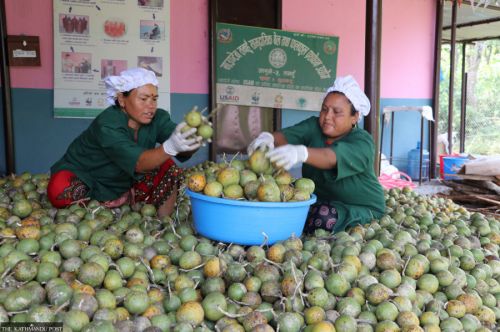
According to an analytical report entitled 'Women in Business' published by the Central Bureau of Statistics, women owned 29 percent of the 922,356 establishments in the country. POST FILE PHOTO
The number of women entrepreneurs taking bank loans surged after the pandemic which the central bank attributed to low interest rates. But analysts say the reported figure is too high to be believable.
There were only a few women entrepreneurs borrowing capital to start or scale up their businesses before the coronavirus descended on the country. But after Covid-19, women started rushing to banks to pick up the concessional loans they were offering.
According to Nepal Rastra Bank, a record 80,061 women entrepreneurs borrowed Rs73.85 billion in concessional loans from banks and financial institutions in the first six months of the current fiscal year.
The steep jump in the number of women taking loans, which are available at 5 percent interest per annum, is due to the mandatory provision imposed on banks to issue concessional loans to at least 10 women entrepreneurs from each of their branches, the central bank said.
The move was aimed at making women participate in entrepreneurship, the bank said.
“The central bank’s new policy has encouraged women entrepreneurs to take loans to either begin or expand their businesses,” said Gunakar Bhatta, spokesperson for Nepal Rastra Bank.
"There has been huge promotion of the concessional loans in recent times at the local level too," Bhatta said.
“Most of the loans taken by women entrepreneurs were for cottage and small scale industry including agriculture and livestock,” Bhatta said.
But some women entrepreneurs say the figure is too large and the report is either misleading or there is something unusual happening.
“It is suspicious. Looking at the number of women entrepreneurs taking such a large amount of loans, we think men are taking advantage of these concessional loan schemes provided to women,” said Reeta Simha, immediate past president of the Federation of Women Entrepreneurs Association of Nepal.
A World Bank report published in 2020 says that in Nepal, many businesses are registered in the name of women specifically to secure government subsidies given to them.
“It is difficult for women to get a loan from banks as there are many criteria they have to meet, due to which many women entrepreneurs we know have not been able to borrow from banks,” Simha said.
According to the Financial Access Report 2021 published by Nepal Rastra Bank, male account holders outnumber females by almost two to one. Among the total 29.92 million account holders in banks and financial institutions, 19.11 million are male and 10.61 million are female.
As a result of the Covid-19 pandemic and prolonged lockdown imposed in the past one and a half years, businesses run by women entrepreneurs were having a hard time staying afloat.
Lack of capital to buy raw materials, pay the workers, pay the rent and other expenses and repay loans as a result of slowed demand for their products has caused immense distress to women, ultimately forcing them to quit.
"Hotel businesses are still down and demand for handicrafts is still low with tourist arrivals slowed to a trickle and few orders coming from international markets. As a result, entrepreneurs do not want the risks of taking loans," Simha said.
According to an analytical report entitled "Women in Business" published by the Central Bureau of Statistics, women owned 29 percent of the 922,356 establishments in the country.
“Most women entrepreneurs belong to the informal sector as they have other responsibilities as well while others are from cottage and small scale industries, and the amount of loans issued is too high as per the data,” Simha said.
"Women start-up entrepreneurs might have taken refinance loans, but the number of women taking loans is still high as per data," Simha said.
According to "Women, Business and the Law 2021", a report launched by the World Bank, Covid-19 has directly and disproportionately jeopardised women’s social and economic capabilities.
The central bank introduced the Unified Procedure on Interest Subsidy for Concessional Loan 2019. Concessional loans are provided to targeted groups for a specific period.
"The government’s concessional loan scheme cannot last forever, so it needs to be targeted where there is high multidimensional poverty like districts in the far west region or Madhes province and districts with a low human development index," Bhatta.
“It will be hard to continue the programme for a long time from a blanket perspective,” he said.
The government has earmarked Rs13 billion in the budget for the fiscal year 2021-22 to provide concessional loans at 5 percent interest to micro, small and medium enterprises, commercial agriculture, youth enterprises, women enterprises and persons returning from foreign employment.
"The government in the upcoming fiscal year will be expanding the limit and scope of concessional loans," said Bhatta.
The government had allocated Rs50 billion in the 2020-21 budget to provide loans at 5 percent interest to cottage, small and medium enterprises and Covid-19 affected tourism businesses to pay their staff salaries. The fund was operated through Nepal Rastra Bank and the money was made available by the government, public enterprises and donor agencies.
Provisions were also made in the 2020-21 budget to provide refinancing facility of about Rs100 billion through Nepal Rastra Bank at a concessional interest rate of up to 5 percent to agriculture, cottage, small and medium industries, businesses, factories and tourism businesses hit by Covid-19.
According to the Federation of Women Entrepreneurs Association of Nepal, there were 5,000 businesses operated by women entrepreneurs providing 50,000 jobs before the pandemic. Similarly, there were 500,000 self-employed women entrepreneurs in different occupations and services across the country.













